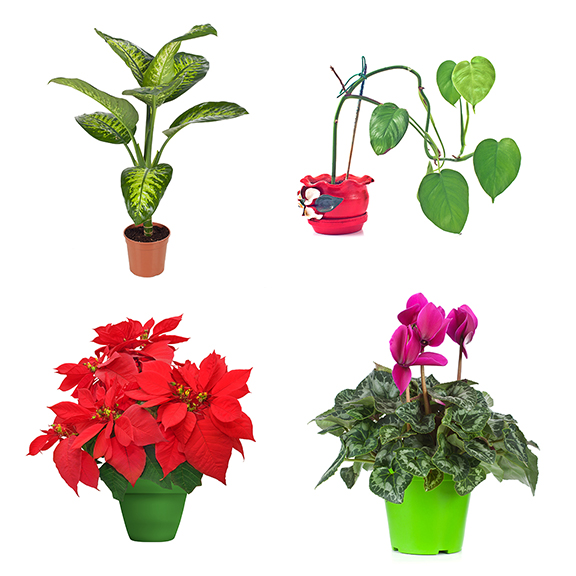Houseplant Awareness: Which Ones Are Safe and Which Ones Are Not for Your Pets
The month of September plays host to National Indoor Plant Week, which runs from the 21st through the 27th. If you love nature, chances are you like to keep plants inside your house. Houseplants add softness and beauty to the home. But if you have pets, you need to be careful of which houseplants you choose. Some plants are toxic to dogs and cats, and can cause a variety of problems, from gastrointestinal irritation to death.
Although the following plants are beautiful, resist the temptation to keep them inside your house where your dog or cat might get to them:

- Aloe Vera (Aloe barbadensis)
- Amaryllis (Amaryllis sp.)
- Angel’s Trumpet (Datura innoxia)
- Angels’ wings (Caladium hortulanum)
- Azalea (Rhododendron sp.)
- Ceriman (Monstera deliciosa)
- Chrysanthemums (Chrysanthemum indicum)
- Croton (Codiaeum variegatum)
- Crown-of-thorns (Euphorbia milii)
- Cyclamen (Cyclamen persicum)
- Devil’s Backbone (Kalanchoe daigremontiana)
- Dumb cane (Dieffenbachia sp.)
- English Ivy (Hedera helix)
- Flamingo lily (Anthurium andraeanum)
- Hydrangea (Hydrangea macrophylla)
- Jerusalem Cherry (Solanum pseudocapsicum)
- Kaffir Lily (Clivia miniata)
- Philodendron (Philodendron sp.)
- Poinsettia (Euphorbia pulcherrima)
If you suspect your pet has ingested one of these plants, contact a veterinarian right away. Immediate symptoms will depend on the plant. Extremely toxic plants, such as Angel’s Trumpet, can cause lethargy, hyperactivity, vomiting, decreased gastrointestinal motility and constipation, dilated pupils, disorientation, tremors, seizures and respiratory depression. Less toxic plants, such as poinsettia, are likely to cause only mild reactions, such as drooling, lip licking, skin irritation, vomiting and diarrhea.
The good news is that plenty of attractive houseplants are fairly safe to keep around pets. Here are some suggestions:
-

Among the myriad pet-safe plants owners could put in their homes and gardens is the ever-popular bamboo.
©JackF /Adobe StockAfrican Daisy (Dimorphotheca aurantiaca)
- African Violet (Saintpaulia ionantha)
- Aluminum Plant (Pilea spp.)
- Baby’s tears (Soleiria soleirolii)
- Bamboo (Phyllostachys aurea)
- Begonia, Climbing (Cissus dicolor)
- Boston Fern (Nephrolepis exaltata)
- Canna Lily (Canna generalis)
- Dwarf Palm (Chamaedorea elegans)
- Easter Lily Cactus (Echinopsis multiplex)
- Garden Snapdragon (Antirrhinum majus)
- Impatience Plant (Impatiens spp.)
- Jasmine (Jasminium species)
- Moss Fern (Selaginella kraussiana)
- Painted Lady (Echeveria multicaulis)
- Spider Plant (Chlorophytum comosum)
- Wax Plant (Hoya carmosa)
- Wild Hyacinth (Dichelostemma pulchellum)
While these plants are not considered harmful to pets if they eat them, keep in mind that any kind of foreign matter ingested by your pet might upset his stomach. You may see vomiting or diarrhea if your dog or cat decides to swallow a large enough amount plant material. Once the chewed up plant has left his system, he should be fine, with no lasting effects.
The best way to avoid having any issues with plants and your pet is to place them in areas where your dog or cat is unlikely to get at them. High windowsills make it hard for dogs—and some cats—to reach, and the extra sun is good for the plants.
For more information on toxic plants, or to get immediate help if you suspect your pet has eaten something poisonous, visit the Pet Poison Hotline at www.petpoisonhelpline.com or call 800-213-6680.
About the Author: Audrey Pavia is an award-winning freelance writer and author of “The Labrador Retriever Handbook.” She is a former staff editor of Dog Fancy, Dog World and The AKC Gazette magazines. To learn more about her work, visit www.audreypavia.com.





